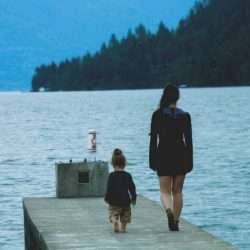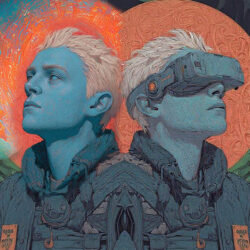♥ Support The Show ♥
Become a patron on Patreon
Leave a one-time PayPal Donation | Send some cryptocurrency
Buy a book | Buy some merch
***See below for a complete topic breakdown.***
Join us on Reddit at r/ATTMindPodcast to discuss this episode.
Is this what human life is?
Is the world we find ourselves in today—with all the strife and war and hatred and polarisation and commercialization and extortion and the rest—is this what it is to be human? Is this what humanity has brought to bear upon ourselves and the world?
Or is it, perhaps, that where we are now is an amalgamated expression of having lost our humanity somewhere along the way? And if this is the case—this we have lost our humanity somewhere along the way—then what might our humanity mean; how did we get so far away from it; and how might we return to a thriving existence?
It is these questions that are explored by our guest for this episode, Dr. Darcia Narvaez.
 Darcia Narvaez is Professor Emerita of Psychology at the University of Notre Dame (Indiana, USA). She is a Fellow of the American Psychological Association, the American Educational Research Association and the American Association for the Advancement of Science. She studies moral development and human flourishing from an interdisciplinary perspective, integrating anthropology, neuroscience, clinical, developmental and educational sciences. She has published hundreds of papers and over 20 books. She serves as president of KindredWorld.org, blogs for Psychology Today (“Moral Landscapes”) and hosts the webpage EvolvedNest.org.
Darcia Narvaez is Professor Emerita of Psychology at the University of Notre Dame (Indiana, USA). She is a Fellow of the American Psychological Association, the American Educational Research Association and the American Association for the Advancement of Science. She studies moral development and human flourishing from an interdisciplinary perspective, integrating anthropology, neuroscience, clinical, developmental and educational sciences. She has published hundreds of papers and over 20 books. She serves as president of KindredWorld.org, blogs for Psychology Today (“Moral Landscapes”) and hosts the webpage EvolvedNest.org.
She was on the podcast previously, way back in ATTMind episode 52, Primal Parenting and The Evolved Nest.
What is the evolved nest?
Simply stated, it is the early life context that leads to human thriving.
It consists of nine components.
- Soothing Perinatal Experiences – include limited stress in pregnancy, no separation of baby from mom at birth, no painful procedures.
- On-request Breastfeeding occurs for several years.
- Positive Moving (and no negative) Touch like carrying and rocking promote neurobiological health.
- Positive Social Climate is a welcoming community culture.
- Self-Directed Social Play is free social play with multiple- aged playmates.
- Multiple Allomothers refers to responsive caregivers other than mothers (e.g., fathers, grandmothers, aunts, uncles).
- Responsive Relationships keep baby contented while the brain rapidly develops, the foundation of healthy childhood growth.
- Nature Connection means developing caring relationships with the natural world of plants, animals and other entities.
- Healing Practices are made routine to mend old wounds. [source]
We explored these components in our previous interview with Dr. Narvaez, and start this interview with a crash-course review on The Evolved Nest.
However, in this episode we focus in on the impact 10,000 years of unnested children is having on our psychology, our morality, and our civilization as a whole. We explore how early life nesting experiences lead to what Narvaez’s calls Cycled Of Cooperative Companionship, and how the undercare of being unnested leads to Cycles Of Competitive Detachment—the cycle most of us are locked into now, a cycle that is definably unhuman.
Furthermore, we explore what it means and what it takes to break that competitive detachment cycle and come back into healthy connection with ourselves, each other, and the natural world.
ಠ_ಠ
discuss this episode on our subreddit
♥ SUBSCRIBE TO THE PODCAST ♥
ITUNES | RSS | STITCHER | TUNEIN | GOOGLE PLAY | YOUTUBE | SPOTIFY | AMAZON
Watch Dr. Narvaez’s 6min mini-documentary on The Evolved Nest
Episode Breakdown
- Context setting this episode’s content
- The Nine Components of the Evolved Nest (see above for a list)
- The cycles of adult behaviour, culture, and child-rearing echoing from the impact of early life experiences.
- Early life stress leads to self-centered morality in adulthood
- Early life “nestedness” leads to Cycles of Cooperative Companionship
- The early life experiences that lead to the Cycle of Competitive Detachment
- How the cycle of competitive detachment impacts the community
- Undercare of children leads to authoritarianism, tribalism, and supremacy in adult cultures
- North American culture raises of to be unhuman
- Connection is an essential nutrient and its deficiency creates a society of hungry ghosts
- The differences between how undercare impact males vs females
- The pandemic isolation has damaged our nervous systems
- It’s important to expand our sense of connection beyond our anthropocentric conditioning
- Are we really more busy than before, or just more inclined towards an anxious stress response
- The potential impact of psychedelics to increase our sense of connection
- The wellness-informed pathway vs the trauma-informed pathway
- My sense of the value of Dr. Darcia Narvaez’s Evolved Nest work
- Links for further connecting with Dr. Narvaez
Please SUPPORT THE PODCAST
OFFER WHAT YOU CAN IN A ONE-TIME PAYPAL OR BITCOIN DONATION, OR you can BECOMe MY PATRON ON PATREON.
No amount is too small; anything is something.
You can also buy one of my books or something from the gift shop.
Or share this post via social media or simply tell a friend about it.
*** Extra BIG thanks to my patrons on Patreon for helping keep this podcast alive! Especially my $23+ patrons, Andreas D, Clea S, Joe A, Ian C, Yvette FC, Chuck W, Alex F, Eliz C, Nathan B, Nick M, & Chloe C
Another special thanks to Andrea, Luke, Andrew, & Makea for generous one-time donations







